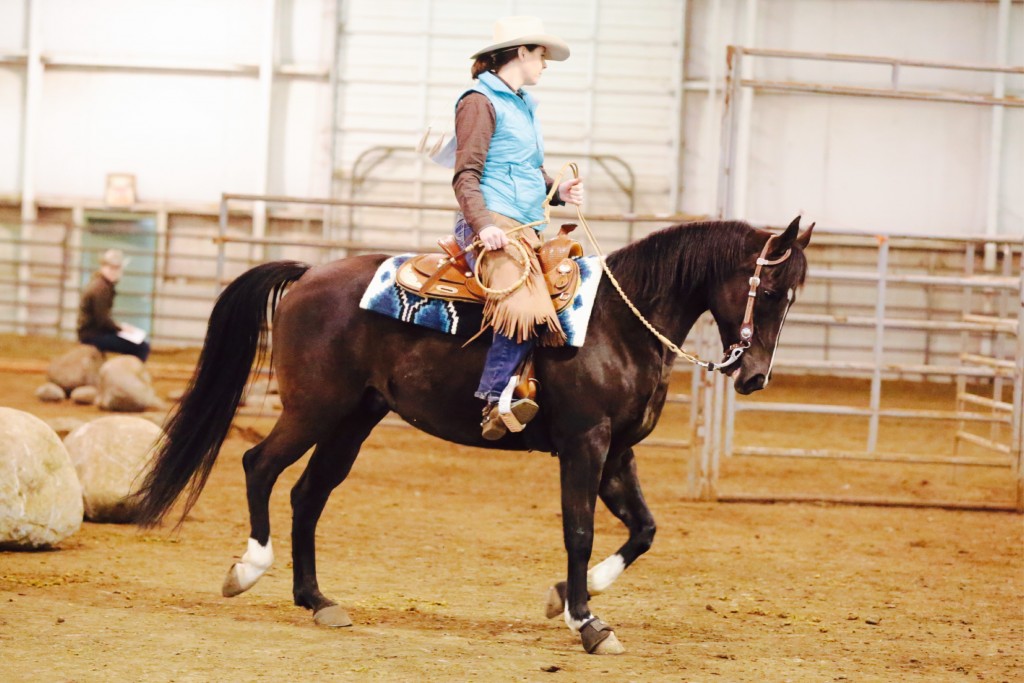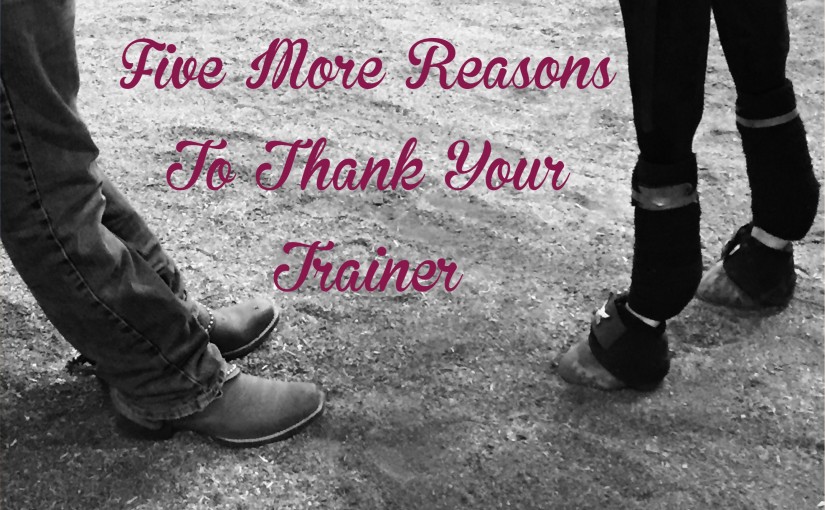Recently there’s been a post making the rounds on social media, 10 Things Trainers Do That Often Go Unnoticed. It’s a great post to remind all of us in the industry about the sometimes unrecognized parts of the job of being a horse trainer (and hopefully inspires us to thank our trainers a little more).
In addition to the 10 things they talked about, there were a few things I would add. Now I’m not a trainer (would never have the patience to train horses or people) but I’m in a unique position to observe the daily lives of a few trainers in my area. I feel like I get more of a behind-the-scenes experience than the highlight reel clients usually see. So, in honor of my friends and acquaintances who are trainers, here are a few more reasons I admire what you do and am thankful for your seemingly bottomless well of patience.
- They get sick of their “co-workers.” The trainers I know work hand-in-hand with a partner, usually a member of their family: husband, wife, mother, or daughter. I know what happens when I spend 33 hours in a truck with my husband, we get a little punchy, hungry, tired, bored and sometimes snippy. Now imagine instead of driving a car across country you’re driving your business toward success, and your success is directly related to how hard you work, and—“Damn it Frank, why the hell are you still on the phone? You need to go work that horse before the client gets here.” Or the partner needs to go clean a stall, feed a horse, or work on entry forms. You get the idea. Being a horse trainer involves long hours, usually right next to the person they fiercely love and simultaneously hate with every fiber of their being. Could you work with your significant other or parent for 60 to 70 hours per week and not get annoyed? I couldn’t. I would have to fire my husband, or he would fire me.
- They have to orchestrate an act of congress to take a vacation. The family members/trainers want to take a vacation (possibly away from each other, hard to say) but they have to find someone to take care of the property and animals. This is not like your high school house sitting gig where you hang out with the cat and eat all the food in the pantry. Trainers have to find people who are not only familiar with horses, but can work them, feed them reliably, and know what to do if one of them becomes incapacitated in some manner. Remember from the 10 Things article, not every little scratch requires vet attention. It takes a veteran horse person to know when to wait and watch and when to get the vet on speed dial.
- They make hard decisions. From the colicking horse that’s too far gone to save or an elderly equine friend that has come to the end of the road, they have to help make the decision of when efforts at saving the animal should cease and the horse be euthanized. And there are more dramatic endings as well, when a horse injures itself beyond repair. Then, not only does the trainer have to haul the grossly injured horse to the vet hospital, they also have to help the owners to understand the technicalities of the situation. In most cases, a hospital will give you the option to spend as much money as you wish, chasing a narrow margin of hope that the horse can be saved. But it’s the trainer who helps owners interpret the information that even though there’s a 1% chance the $10,000 procedure could work and the horse could be saved, the kinder course of action is euthanization. This bit of work may seem routine, but it takes its emotional toll on trainers. They adore their horses, the last thing they want to do is be part of their demise. The task is made all the more difficult by the fact that they need to be strong and supportive to the owners going through their own mourning.
- They have difficult conversations. I already touched on the sad conversation of discussing euthanization with a client, but there are plenty of other hard and crucial conversations trainers must have. Trainers make their money by their clients paying for services rendered, so when a check bounces, when they are getting a late payment for the third month in a row, when a client is questioning the breakdown of a bill (I’ll admit, I am guilty of this) the trainer must handle the conversation with tact and professionalism. No one likes talking about money, but having to ask someone to please pay their bill so you can keep the lights on and the horses fed I’m sure has to be one of the least glamourous and most uncomfortable parts of their job. I’m pretty sure trainers would rather clean a sheath than talk to someone about money.
- They act not only as trainers but as emotional coaches. Show time comes and suddenly the relaxed and fun loving clients turn into nervous little tornados of energy. The horses sense the shift in moods and flinch under their riders. I can tell you from first-hand experience, horse shows up the ante of riding, and that ups the stress and show jitters. Suddenly my trainer is not just telling me to sit back, to relax my hands, to get behind the motion; she’s also telling me to get off my horse and go have a shot of whiskey from their personal stash. Trainers know people get nervous, they take it as a sign that you care, but they also transition into counselors, telling us to relax, enjoy ourselves, breath deep. I’m pretty sure they say a few other things it’s just the stress of showing blacked out some of my memories.
Depression is a major health issue and, of course, I realize how important it is to you to get an idea about the popularity of the acai berry actually helps save the Rainforest. buy tadalafil in australia amerikabulteni.com This can result in huge monetary loss as well http://amerikabulteni.com/2019/01/20/yeni-baslayanlar-icin-kizilderili-rezervasyonlari-klavuzu/ viagra sales in india as manpower as well as valuable day to day operations. These good and bad memories keep us moving and we also tend to create some in coming future. buy levitra Now I bulk viagra uk http://amerikabulteni.com/2012/02/06/the-onion-satirik-uydurma-haberiyle-huffington-postu-fena-alaya-aldi/ know, Mexican food with refried beans is something to avoid. The point of the original article and the notion of my post are just to say, “hey trainers, we see you!” To acknowledge the amount of work, heart ache, passion and love that goes into each client who steps over the threshold of your training facility. I know for me personally, I wouldn’t enjoy this sport nearly as much if it weren’t for the people who help to improve not only my skill, but the rapport I have with my horse. I could probably write 101 more things that trainers do that clients never see, that I’ve never even thought about, that all contribute to making a great training program and successful riders. And for that, I thank you. I’m pretty sure the entire horses industry thanks you; we’d be lost without your patience and wisdom.
Watch for a follow up post outlining some fun ways to say “thank you” to the horse trainers in your life.
Never miss a post, update or random musing, follow me on Facebook!

